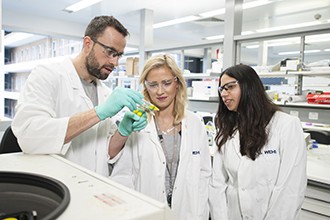A team of researchers from the Walter and Eliza Hall Institute of Medical Research in Melbourne, Australia have revealed the critical importance of highly specialized immune cells, called natural killer cells, in killing metastatic melanoma cells that have spread to the lungs. These natural killer cells could be harnessed to hunt down and kill cancers that have spread in the body.
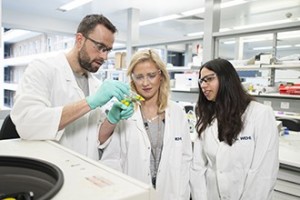
The Australian scientists also found that the natural killer cells are critical to the body’s rejection of donor bone marrow transplants and in the runaway immune response during toxic shock syndrome. The discoveries came after the team showed that a protein called MCL-1 is crucial for survival of natural killer cells, in research published this month in the journal Nature Communications.
The paper, entitled “Innate immunodeficiency following genetic ablation of Mcl1 in natural killer cells,” (Published 14 August 2014 Nature Communications 5, Article number: 4539 doi:10.1038/ncomms5539) is coauthored by Priyanka Sathe, Rebecca B. Delconte, Fernando Souza-Fonseca-Guimaraes, Cyril Seillet, Michael Chopin, Cassandra J. Vandenberg, Lucille C. Rankin, Lisa A. Mielke, Ingela Vikstrom, Tatiana B. Kolesnik, Sandra E. Nicholson, Eric Vivier, Mark J. Smyth, Stephen L. Nutt, Stefan P. Glaser, Andreas Strasser, Gabrielle T. Belz, Sebastian Carotta, Nicholas D. Huntington, variously of The Walter and Eliza Hall Institute of Medical Research, the University of Melbourne Department of Medical Biology, the QIMR Berghofer Medical Research Institute and the University of Queensland School of Medicine, at Herston, Queensland, Australia, and the Centre dImmunologie de Marseille-Luminy, INSERM, at Marseille, France.
The coauthors note that the cytokine IL-15 is required for natural killer (NK) cell homeostasis, but the intrinsic mechanism governing that requirement remains unexplored. In their paper, the researchers say they have identified the absolute requirement for myeloid cell leukemia sequence-1 (Mcl1) in the sustained survival of NK cells in vivo. Mcl1 is highly expressed in NK cells and regulated by IL-15 in a dose-dependent manner via STAT5 phosphorylation and subsequent binding to the 3-UTR of Mcl1.
They observe that specific deletion of Mcl1 in NK cells results in absolute loss of NK cells from all tissues, owing to a failure to antagonize pro-apoptotic proteins in the outer mitochondrial membrane. This NK lymphopenia results in mice succumbing to multiorgan melanoma metastases, being permissive to allogeneic transplantation and being resistant to toxic shock following polymicrobial sepsis challenge, and that these results clearly demonstrate a non-redundant pathway linking IL-15 to Mcl1 in the maintenance of NK cells and innate immune responses in vivo, and that the discovery will help to determine how natural killer cells can be manipulated to fight cancers and other disorders.
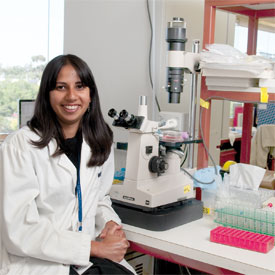 Coauthors Dr. Nick Huntington, Dr Priyanka Sathe and Ms. Rebecca Delconte from the Molecular Immunology division comment in a Hall Institute release that MCL-1 could be a target for boosting or depleting natural killer cell populations to treat disease, noting that natural killer cells are immune predators, scouring the body in search of foreign invaders such as viruses, and sensing changes in our own cells that are associated with cancer.
Coauthors Dr. Nick Huntington, Dr Priyanka Sathe and Ms. Rebecca Delconte from the Molecular Immunology division comment in a Hall Institute release that MCL-1 could be a target for boosting or depleting natural killer cell populations to treat disease, noting that natural killer cells are immune predators, scouring the body in search of foreign invaders such as viruses, and sensing changes in our own cells that are associated with cancer.
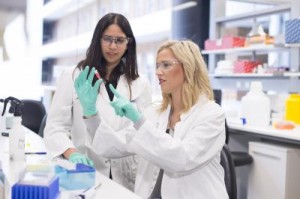
The Walter and Eliza Hall Institute of Medical Research Molecular Immunology division’s research aims to provide a basic understanding of how the immune system is formed and how it functions based on external and internal drivers. We are also interested in how microbes, such as viruses and bacteria, impact the immune system. Particular emphasis is placed on understanding the factors that control the later stages of lymphocyte and DC maturation into effector cells and how this impacts on the immune response, examining the extrinsic (cytokines) and intrinsic (transcription factors), and the epigenetic regulators of these processes. This research will also bolster expertise in human immunology by initiating projects aimed at understanding the production of blood cells by human stem cells, and the in vitro differentiation of human lymphocytes and dendritic cells.
Dr. Nick Huntington’s lab studies how human immune cells develop in hope that this research will eventually reveal the cause and consequences of errors in immune cell development that lead to diseases such as chronic infections, leukaemia and immune deficiencies.
Dr. Huntington’s team has generated novel human immune system models that allow them to study early stages of immune cell development, noting that the human immune system has evolved multiple approaches to protect us against a large array of pathogens that if not adequately dealt with can cause disease. He explains that the body’s immune response depends on continual generation of a diverse panel of white blood cells formed from progenitors in the bone marrow.
The Huntington lab is focused on understanding how, when, and where human haematopoietic progenitor cells diversify into different white blood cell types, and are also using genetic approaches to alter the normal behavior of progenitors to generate models of human disease. The lab is particularly interested in a type of white blood cell called natural killer cells, that participate in pathogen defence by producing of pro-inflammatory cytokines or cytolytic granules. During development in the bone marrow, natural killer cells become dependent on interleukin-15 for their development and homeostasis, and the Huntington lab is interested in how IL-15 regulates these processes, and we have made pivotal discoveries allowing us to generate novel models of deregulated natural killer cell homeostasis that will allow us to dissect the role of these cells in disease.
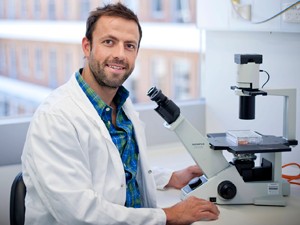 Dr. Huntington says the study research team showed natural killer cells were needed to fight off invading tumour cells that had spread past the original cancer site, observing: “We discovered MCL-1 is absolutely essential for keeping natural killer cells alive. Without natural killer cells, the body was unable to destroy melanoma metastases that had spread throughout the body, and the cancers overwhelmed the lungs.”
Dr. Huntington says the study research team showed natural killer cells were needed to fight off invading tumour cells that had spread past the original cancer site, observing: “We discovered MCL-1 is absolutely essential for keeping natural killer cells alive. Without natural killer cells, the body was unable to destroy melanoma metastases that had spread throughout the body, and the cancers overwhelmed the lungs.”
Knowing how important natural killer cells are for detecting and destroying cancer cells as they spread suggests they would be a good target for boosting immune defenses to treat cancer. Natural killer cells are present in high frequency in our blood and patrol the bodys frontlines the lungs, intestines, mucous membranes and skin to detect and destroy diseased cells.
However these predatory natural killer cells are a double-edged sword. Dr. Huntington explains that the team showed natural killer cells also played a role in death from toxic shock (sepsis), and in rejecting bone marrow transplants.
“Natural killer cells led the response that caused rejection of donor stem cells in bone marrow transplantations,” Dr Huntington says. “They also produced inflammatory signals that can result in toxic shock syndrome, a potentially fatal illness caused by bacterial toxins that causes a whole-body inflammatory reaction.”
Dr. Huntington adds that the discovery provided a solid lead to look for ways of boosting natural killer cells when they are needed in higher supply, or depleting them when they are causing illness. “We showed MCL-1 levels inside the cell increase in response to a blood cell signalling protein called interleukin 15 (IL-15)”, he notes. “We previously knew IL-15 boosted production and survival of natural killer cells, and we have shown that IL-15 does this by initiating a cascade of signals that tell the natural killer cell to produce MCL-1 to keep it alive. Now that we know the critical importance of MCL-1 in the survival of natural killer cells, we are investigating how we might manipulate this protein, or other proteins in the pathway, to treat disease.”
The Walter and Eliza Hall Institute of Medical Research is the oldest medical research institute in Australia and will celebrate its centenary in 2015. The institute is affiliated with The University of Melbourne The University of Melbourne and The Royal Melbourne Hospital and offers postgraduate training as the Department of Medical Biology of The University of Melbourne.
The research was supported by the Australian National Health and Medical Research Council, The Menzies Foundation and the Victorian Government.
Sources:
The Walter and Eliza Hall Institute of Medical Research
Nature Communications
Image Credits:
The Walter and Eliza Hall Institute of Medical Research

